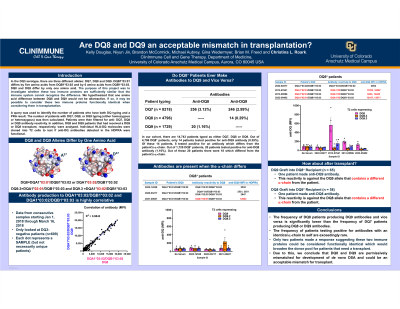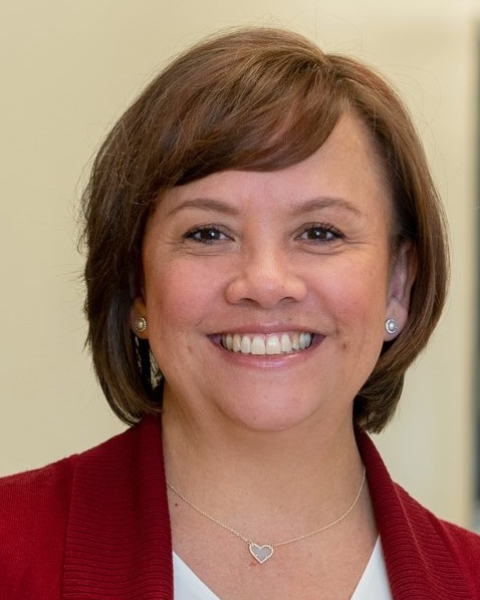(P811) Are DQ8 and DQ9 an acceptable mismatch in transplantation?
Location: Platinum Ballroom

Poster Presenter(s)
Aim: In the DQ3 serotype, there are three different alleles: DQ7, DQ8 and DQ9. DQB1*03:01 differs by five amino acids from DQB1*03:02 and by 6 amino acids from DQB1*03:03. DQ8 and DQ9 only differ by one amino acid. We hypothesized that one amino acid difference between DQ8 and DQ9 would not be alloreactive.
Method: A query was designed to identify the number of patients who have both DQ typing and a PRA result. The number of patients with DQ7, DQ8, or DQ9 typing (either homozygous or heterozygous) was then calculated. Patients were then filtered for DQ7, DQ8 or DQ9 antibody reactivity. In addition, DQ8 and DQ9 patients that had received a DQ9 or DQ8 transplant, respectively, were analyzed.
Results: In our cohort of 24,171 patients with PRA results, 14,806 patients express DQ3. There are 8,218 patients with DQ7, 4,796 patients with DQ8 and 1,729 patients with DQ9. Out of 8,218 patients with DQ7, 256 patients produced DQ8 antibody (3.12%), and 246 patients produced DQ9 antibody (2.99%). Out of 4,796 patients with DQ8, only 14 patients tested positive for DQ9 antibody (0.29%). Of these 14 patients, 8 tested positive for an antibody which differs from the patient’s a-chain. Out of 1,729 patients with DQ9, 20 patients tested positive for DQ8 antibody (1.16%). Out of these 20 patients there were 18 which differed from the patient’s a-chain.
When we examined post-transplanted recipients, 65 of the DQ8 patients had received a donor graft with DQ9 antigens. Only one patient tested positive for a DQ9 antibody. This DQ9 allele contains a different a-chain from the patient. Of the DQ9 patients, 58 had received a donor graft with DQ8 antigens. Only one patient tested positive for a DQ8 antibody. This DQ8 allele also contains a different a-chain from the patient.
Conclusion: The frequency of DQ8 patients producing DQ9 antibodies and vice versa is significantly lower than the frequency of DQ7 patients producing DQ8 or DQ9 antibodies. The frequency of patients testing positive for antibodies with an identical a-chain to self are exceedingly rare. Due to this, we conclude that DQ8 and DQ9 are permissively mismatched for development of de novo DSA and could be an acceptable mismatch for transplant.
Method: A query was designed to identify the number of patients who have both DQ typing and a PRA result. The number of patients with DQ7, DQ8, or DQ9 typing (either homozygous or heterozygous) was then calculated. Patients were then filtered for DQ7, DQ8 or DQ9 antibody reactivity. In addition, DQ8 and DQ9 patients that had received a DQ9 or DQ8 transplant, respectively, were analyzed.
Results: In our cohort of 24,171 patients with PRA results, 14,806 patients express DQ3. There are 8,218 patients with DQ7, 4,796 patients with DQ8 and 1,729 patients with DQ9. Out of 8,218 patients with DQ7, 256 patients produced DQ8 antibody (3.12%), and 246 patients produced DQ9 antibody (2.99%). Out of 4,796 patients with DQ8, only 14 patients tested positive for DQ9 antibody (0.29%). Of these 14 patients, 8 tested positive for an antibody which differs from the patient’s a-chain. Out of 1,729 patients with DQ9, 20 patients tested positive for DQ8 antibody (1.16%). Out of these 20 patients there were 18 which differed from the patient’s a-chain.
When we examined post-transplanted recipients, 65 of the DQ8 patients had received a donor graft with DQ9 antigens. Only one patient tested positive for a DQ9 antibody. This DQ9 allele contains a different a-chain from the patient. Of the DQ9 patients, 58 had received a donor graft with DQ8 antigens. Only one patient tested positive for a DQ8 antibody. This DQ8 allele also contains a different a-chain from the patient.
Conclusion: The frequency of DQ8 patients producing DQ9 antibodies and vice versa is significantly lower than the frequency of DQ7 patients producing DQ8 or DQ9 antibodies. The frequency of patients testing positive for antibodies with an identical a-chain to self are exceedingly rare. Due to this, we conclude that DQ8 and DQ9 are permissively mismatched for development of de novo DSA and could be an acceptable mismatch for transplant.

